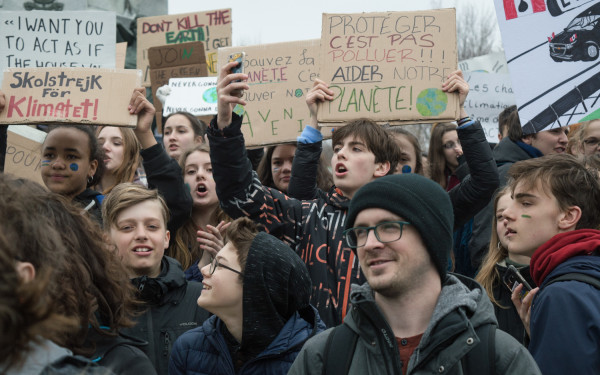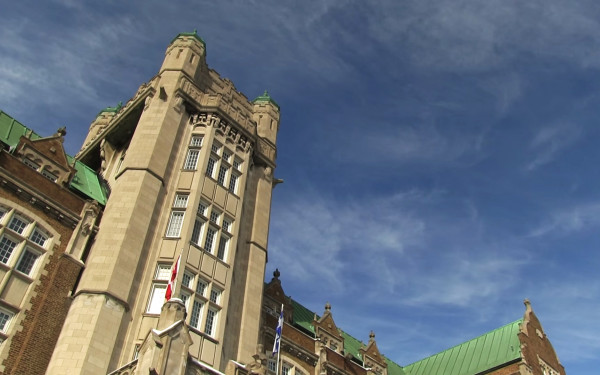Concordia Researchers Connect Climate Change to Increased Water Consumption
Research Presents 30 Year Forecast of Urban Water Consumption
Research conducted by a Concordia student and two professors shows global warming will noticeably increase urban water consumption.
A long-term forecast of water consumption is important for supporting sustainable urban development. Since urban water infrastructures are built to last for around 30 years and changing them is expensive, municipalities want be able to predict and circumvent any issues that may arise, said Dr. Samuel Li, one of the project’s researchers and an engineering professor at Concordia.
So, which factors affect water consumption, and how will water consumption change over the next 30 years?
Three Concordia researchers tackled these questions and showed that temperature has a significant effect on water consumption, and since the global temperature is rising, it will noticeably increase urban water consumption in the future.
They analysed the household water consumption data of the municipality of Brossard from 2011 until 2015.
“We picked the city of Brossard because the water is metered [daily]. So, you have the water meter in each household, you know exactly what they’re using in every house,” explained Li.
The researchers observed a crucial dependence of water consumption on the temperature.

The study showed that the amount of water consumption when the temperature is between -20 C and 8 C is almost a constant, see the above graph. This is called base water consumption. As the temperature increases to above 8 C, the water consumption increases dramatically with the temperature. This is called seasonal water consumption.
Base water consumption is what’s used indoors, like for cooking and personal hygiene. According to Li, these uses of water remain at a constant level throughout the year.
Seasonal water consumption, however, concerns outdoor water consumption. This increases significantly during the summer, as people start doing outdoor activities. “[We] end up using more water when the temperature is higher,” said Li.
As the global temperature increases and the climate changes, one may wonder how does water consumption increase?
This question was the starting point of this research, according to Li.
“Most of the studies [on water consumption] have been done assuming that the climate does not change, so it’s not a factor in the equation. [But] we have enough evidence to believe that climate change is on the way very soon and we must take it into account,” he said.
But how will the temperature rise in the next 30 years? There is no definite answer: it crucially depends on how much we reduce global greenhouse gas emissions.
“Most of the studies [on water consumption] have been done assuming that the climate does not change, so it’s not a factor in the equation. [But] we have enough evidence to believe that climate change is on the way very soon and we must take it into account.” —Samuel Li
Among various global temperature predictions, this research has considered two standard scenarios: a good scenario which assumes the peak of GHG emissions is 2040 and they decrease afterwards, and a bad scenario which assumes the GHG emissions continue to rise throughout the century.
Their research predicted a trend of increasing seasonal water consumption for the next three decades. Compared to the good scenario, the bad scenario is shown to cause a four per cent increase in the annual urban water consumption.
The research project took two years to complete and was a collaboration between Niousha Rasifaghihi, Dr. Samuel Li, and Dr. Fariborz Haghighat, and was published in the January 2020 issue of the Sustainable Cities and Society journal.
Niousha Rasifaghihi was a civil engineering master’s student from 2018 to 2019. Before enrolling at Concordia, she had worked at Tehran Province Water and Wastewater as a junior analyst for two years.
Fariborz Haghighat, like Li, is a professor of building, civil, and environmental engineering at Concordia.
Haghighat specializes in electricity consumption, a field that shares similarities with water consumption. “That’s the reason we work together and collaborate and co-supervise students,” said Li.
“Population growth and climate change play a big role in future developments,” said Li. He hopes their research can be used for urban planning in the future.
“We were really excited for incorporating the water consumption in the big picture of the infrastructure support for city and urban areas,” he said, “We are going to have probably another master’s student to look into a longer time horizon, because the longer the data record, the more reliability you will have for the quality of results.”







